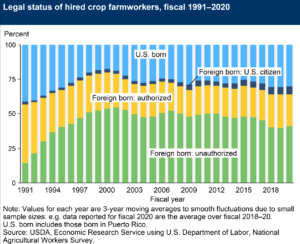



US ag industry groups concerned over Trump's deportation plans
There's the obvious concern of losing a significant portion of the ag workforce. Plus, mass deportations would disrupt the food chain, slowing production and increasing prices of grocery store staples, including milk, wheat and eggsBloomberg’s Kim Chipman, Joe Mathieu, and Tarso Veloso reported Tuesday that “President-Elect Donald Trump’s threat of mass deportations risks hurting the domestic agriculture sector already struggling with labor shortages.”
“That’s according to Matt Carstens, chief executive officer of Iowa’s biggest farm cooperative, who said Trump’s plan should be approached carefully. Farming would be one of the biggest US sectors hit should the incoming administration move forward with kicking potentially millions of undocumented immigrants out of the country,” Chipman, Mathieu and Veloso reported. “‘We’ve got to make sure there’s a balance there, that agriculture’s voice is heard,’ Landus CEO Carstens said during an interview on Bloomberg Television’s ‘Balance of Power.’”

“The US Department of Agriculture has said nearly half of hired crop farmworkers lack legal immigration status,” Chipman, Mathieu and Veloso reported. “The share of laborers not lawfully authorized to work in the US rose from about 14% in the 1989-91 period to roughly 40% in recent years. Meanwhile, although there’s been a slight decline in the number of people moving out of rural US counties since the onset of the global Covid-19 pandemic in 2020, the prior decade saw an overall loss of population.”
Dairy producers especially concerned
Agri-Pulse’s Steve Davies reported Wednesday that “producers are worried, chief among them dairy farmers whose operations rely heavily on immigrant labor. The National Milk Producers Federation, citing a 2015 study, says 51% of the workers at dairy operations are immigrants.”
“Steve Obert, executive director of Indiana Dairy Producers, said he has seen figures showing that as many as 80% of dairy farm workers are immigrants, though he doesn’t know how many lack proper documentation,” Davies reported. “He hopes the new administration will push for comprehensive immigration and workforce reform instead of trying to deport what is estimated to be at least 14 million immigrants, including approximately 1 million in the agricultural sector.”
“Farm workforce reform legislation advanced through the House in the previous Congress but stalled in the Senate when Idaho Republican Mike Crapo did not back legislation introduced by Sen. Michael Bennet, D-Colo. Crapo said one of the reasons he didn’t back Bennet’s bill was that it that would have made ‘certified agricultural workers, who are currently undocumented, eligible for federal benefits like health care tax credits and food purchasing benefits for low-income Americans and families,'” Davies reported. ”
“Obert and milk producers nationwide warn of devastating consequences if they lose their workers. NMPF say the retail cost of milk would double and the economy would take a $32 billion hit,” Davies reported. “‘If we have mass deportation and the border gets sealed off, bigger problems will be created than just illegal immigration,’ Obert said, pointing to the impacts on Trump’s campaign pledges to lower inflation and address the lack of housing. ‘All those would be much worse if we lose at least 50% of our workforce,’ he said.”
Impact could be especially significant in California
The Guardian’s Cecilia Nowell reported on Monday that “more than 400 types of commodities are grown in the Golden state – including a third of the vegetables and three-quarters of the fruits and nuts produced in the United States.”
“Much of that food is grown by immigrant farm workers – many of whom are undocumented,” Nowell reported. “According to the US Department of Agriculture (USDA), about half of the country’s 2.4 million agricultural farm workers do not have legal status in the US. But farm worker advocates say the number is much higher in places like California, where it can be ‘as high as 70% in some areas,’ according to Alexis Guild, vice-president of strategy and programs at Farmworker Justice, a non-profit based in Washington DC.”
“In 2023, California’s agricultural exports totaled more than $24.7bn, according to the USDA. The state was the nation’s sole producer of many specialty crops – including almonds, artichokes, figs, olives, pomegranates, raisins and walnuts – and the leading producer of other staples, such as lettuce and celery,” Nowell reported. “‘Proposed deportations would be absolutely devastating not just for immigrant households, but most American households,’ Flores said. ‘Mass deportations would disrupt the food chain at a time when inflation is one of workers’ most pressing concerns.‘ He added that such deportations would slow production and increase prices of many grocery store staples, including milk, wheat and eggs.”
“Without the undocumented immigrant workforce, the United States would probably import more of its food supply – making food prices vulnerable to fluctuations and to Trump’s proposed tariffs,” Nowell reported.
Davies reported that “Michael Marsh, president and CEO of the National Council of Agricultural Employers, says he has the impression that Stephen Miller and other deportation proponents believe, despite evidence to the contrary, that Americans will jump to fill jobs left vacant if immigrants leave.”
“‘If you had to deport almost a million farm workers, who would you replace them with?’ he asked,” according to Davies’ reporting. “Marsh notes the H-2A program brings in about 300,000 workers a year, which would need to be more than tripled to make up for the loss of farmworkers. However, he noted that dairy farmers and poultry and livestock operators don’t qualify for H-2A.”
This article was originally published by farmdoc.


